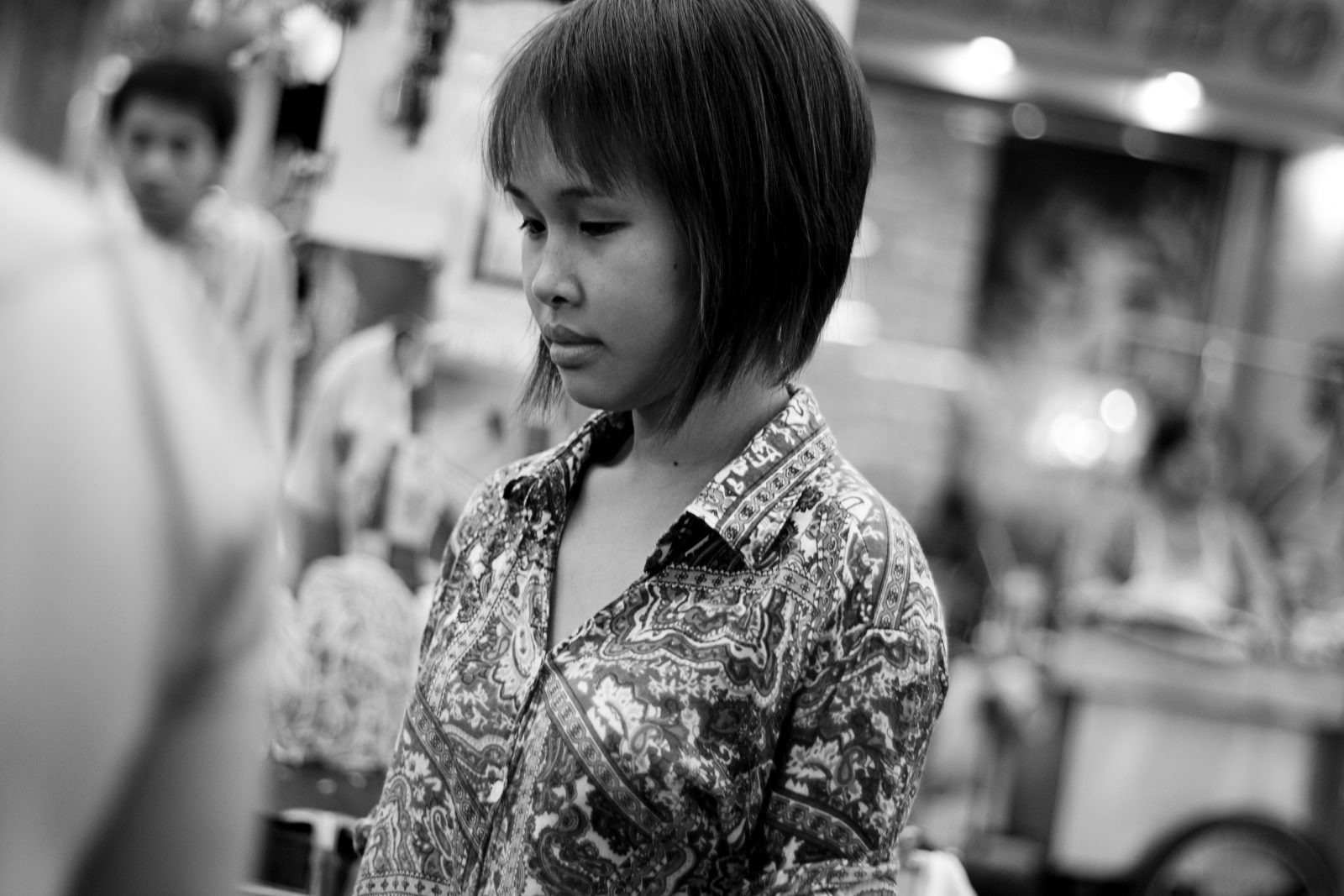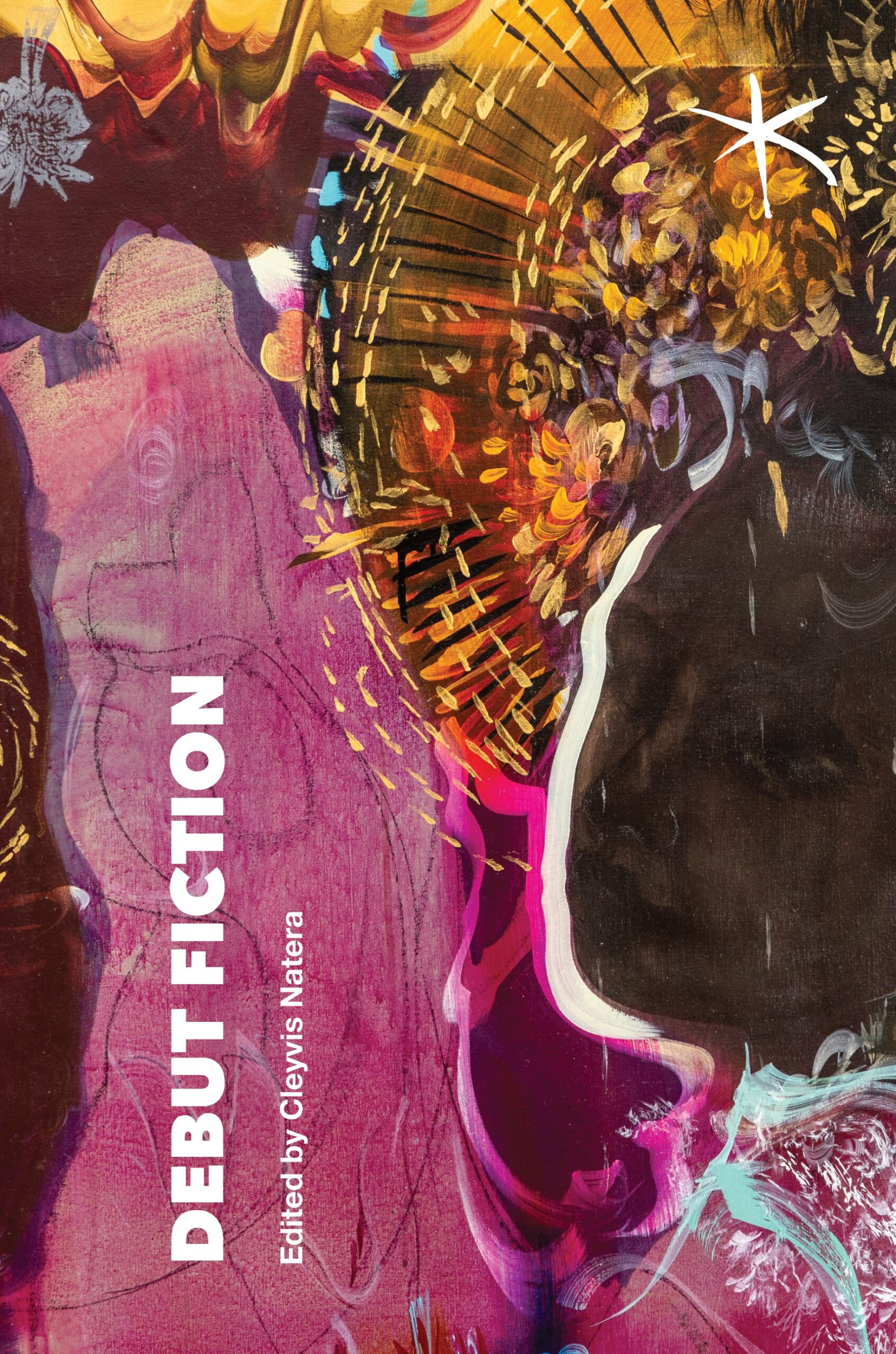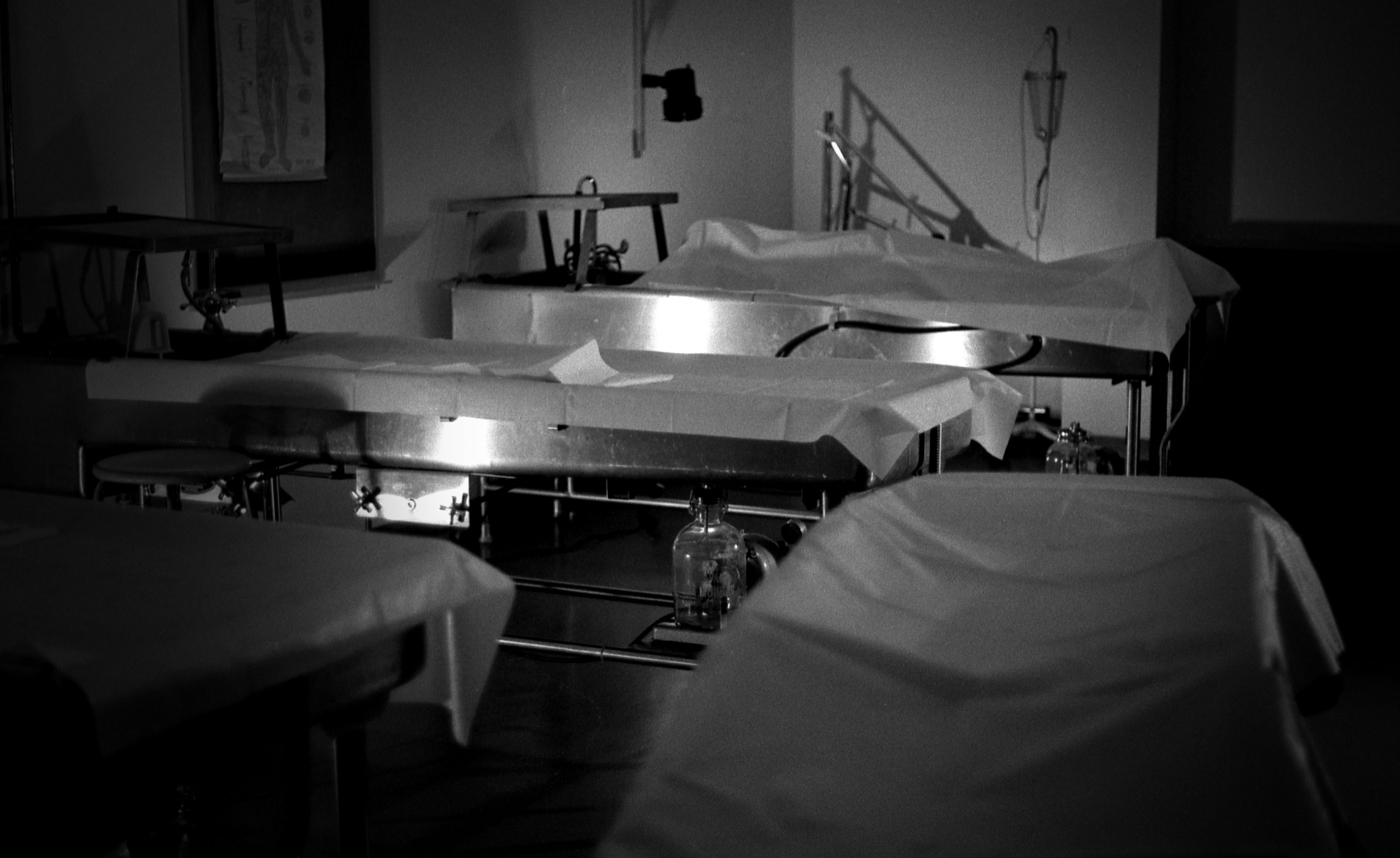
1.
Tell yourself, at least he’s kind. You don’t know this for sure, but the odds are good—look at all his gifts. Roses yesterday (not cheap), Hershey’s Kisses today (too obvious). You’ll realize this one day far in the future, but for now, you’re nineteen and only six months out of your father’s house—what do you care? Tell yourself that Americans don’t beat their wives—you know this because you’ve seen it on TV—in America, husbands buy their wives diamond rings, cruise ship tickets, Maytag washing machines, and say “I love you” on the phone. In America, husbands and wives kiss in public, call each other “Baby,” go away on second honeymoons. Actually, you have witnessed none of it yourself, but any day now, you believe you will.
This one, he’s not quite what you were expecting, but he’s all right, weight and height notwithstanding. Tell yourself he’s not fat, he’s stocky—just a little on the heavy side. He’s also not tall, not even by Singaporean standards—the first time he came up to you in the cafeteria line, you were looking him straight in the eye, which means he’s not even as tall as your tallest cousin, who with your other cousins have remained on the other side of the Pacific—but then, what do you need a tall one for? Looks aren’t supposed to matter and you’re not superficial. Remind yourself you’re not superficial, having been raised among temples and oranges offered on red kitchen altars to the Buddha of Great Compassion. Remind yourself, at Thaipusam, your neighbors walked unscathed on hot coals during the festivities, their skeletal shoulders bare beneath the equatorial sun. That’s the world you’re from, not this America of plump skin and overwhelming dinner portions and expensive bits of clothing protecting almost nothing. Remind yourself whose daughter you are, whose granddaughter, whose niece, whose pupil.
“You have such a spiritual face,” he tells you, his middle finger on a slow expedition up the inside of your thigh. No other guy has ever tried to get this far with you and when he flicks back the hem of your panties and slips in at the crotch, you’re wetter than you thought you’d be. His finger wiggles around the mouth of your vagina, warm and thick as a cocktail sausage. You’re not sure if you want to go on—you think, maybe not, because suddenly he’s leaning close and his breath on your face makes you claustrophobic. Say nothing. Think about the time your cousins lowered you in the wooden bucket, farther and farther down the old church well. “Sekali jatoh, then how?” your aunts scolded the eldest, Gabriel, who was thirteen at the time, when they found out. You had thought it, too, in the well—you had thought that you might fall, the cold air plastered to your neck like mold. You survived that. You can survive this.
(No one’s told you, yet, that sex doesn’t have to be survived so meanwhile) tell yourself he’s kind, not stingy with his money where you’re concerned. Besides, he’s gentle with his fingers, and since no guy’s ever gotten this far with you, feel free to mistake surprises for pleasure. Let him slide one finger in, then two. Forgive the accidental scrape of nail, the searing heat of sudden blood. Someday, everything about him will become ordinary. This figment of knowledge presses on your chest, clogs your throat like dust—voices from another room thicken in your ears, threading you back to your father’s house. So look up, while you can, at Orion’s Belt spreading so gloriously behind the maple leaves. At the first clink of buckle, bite your lower lip. Breathe slowly when he unzips. Turn your cheek to the ground and smell this American grass against your hair.
There are women everywhere who are alone—spinsters like your Koko Mathilda even though she’s gorgeous, widows like some of your other aunts who will never re-marry.
Tell yourself you’re lucky.
Later, when washing your panties in the dormitory sink, gaze in the mirror. Find his words in your mother’s expression that everyone who’s known you since you were a child says you carry in your eyes. You have such a spiritual face. Against the bated fluorescent breath of this fall night on a university campus at the edge of your new world, follow the rise of your family’s cheekbones, the compressed triangle of your father’s nose, the mild downturn of his lips. No one has ever called you pretty, though an uncle did comment, once, on your pleasant smile. Pretty was reserved for your cousins Maureen, Noreen and Doreen, Gabriel’s sisters who helped lower you down the well. You are no fool. You’re aware that pleasant isn’t the same as pretty, and neither is spiritual. But spiritual has brought you flowers and chocolates and who knows what else is waiting up ahead? Spiritual brought you an actual date, with a movie and popcorn thrown in, and someone wanting to make love to you under the stars. So spiritual is all right. More than all right.
Pay attention now. You don’t know it, yet, but here’s your formative moment. You’re not superficial. You’re spiritual, because as you will soon learn, your past is the East, full of the rustle of beaded screens swinging between what’s real and not real. Your past is Susie Wong, Marco Polo, a twilight without geography. Pay attention. This is the mystery that you are on the brink of becoming in America. It’s your ticket into the American heart.
2.
Now the going gets tricky. You’ve got to get serious about your accent, that ocean lilt from the other room, English pronounced as if it weren’t English, your family’s British Commonwealth grammar all mixed up. Your Koko Stella complaining about your youngest uncle and his girlfriend, about their exhibitionist behavior, how they’re always hugging and fawning over each other. “T’ak seronoh, those two. Every time they go jalan, must pulok-pulok. Sudah kena spotted-lah, last night. And by whom, you know? By Madam Big Mouth herself. You see-lah, boleh mati, t’ak?” Koko Stella, your father’s married sister, your mother’s kindergarten friend and Gabriel’s mother, bustles around inside your head, her voice pumping you full of memory. She wears batik colors and a hair net, smokes cigars with your uncles and has almost nothing good to say about the younger generation, except when it comes to you. You she loved, too obviously and too much. Don’t forget that old church well, the receding circle of afternoon sky, your cousins’ faces peering down in shadow. Tell yourself it’s okay to let go. Start with Koko Stella. When putting her in a story for Creative Writing 202, catch every “lah” in mid-flow. Leaping as it did from another language, anyway, the word is merely pace—untranslatable. Slice it off. Koko Stella would want you to let go. Wouldn’t she? She would want you to build a life, make the most of your time in America, be happy. You suspect she’d feel differently if she knew you wouldn’t be going back, so don’t tell anyone you won’t be going back. Don’t tell anyone you’ve already got yourself a boyfriend, who’s stocky, not fat, and says “I love you” on the phone, and calls you “Baby” in bed. They won’t guess if you don’t tell. You’re twenty and barely two years out of your father’s house. You haven’t even lost your accent, though you’ve learned to dangle “cool” and “dude” and “whassup” off your sentences like Navajo silver, as if you were some Asian chick from California.
You’ve learned to high five.
While no one’s looking, read The Woman Warrior, House on Mango Street, and Notes of a Native Son. Read The Way to Rainy Mountain. In coffee houses, on the bus, in the aisles at K-Mart, count to yourself the number of Americans with bones like the bones of faces that help you sleep. Eventually, when you close your eyes, you will not miss the lullaby of frogs in the long grass, the billowing fragrance of orchids and frangipani and the gamelan call of the bamboo. You will forget that incense no longer wafts up the stairs, floating prayers for prosperity and health past your door.
Tell yourself it’s all for the best. Remind yourself, you want the future more than memory.
Get used to the phrase, “people of color.” Think of yourself as “we.” When asked, “Where are you from?” if your boyfriend’s not around, say, “San Francisco.” Say, “Seattle.” Say, “Queens, New York.” Any one of these will do. When asked, “But where are your parents from?” say, “San Francisco.” Say, “Seattle.” Say, “Queens, New York.”
Always answer the phone when it rings. When your boyfriend asks, “Don’t you think it’s time you told them?” tell him you will, soon. When he says, “Don’t you want to get married?” don’t panic. Remember that Europeans have been imagining the East for generations—you have an entire culture to use as an excuse. Say, “My father’s very Chinese. He needs some time to get used to the idea of my marrying a non-Chinese.” Don’t tell him about your father’s blondie girlfriend—how on your fourteenth birthday, your father came home drunk with a new German secretary from the office who giggled and blurted out her name, Regina, (a hard g), while your aunts were handing out slices of cake to your classmates and Sister Marie, who taught music and folk dancing during the week, and aikido on Saturdays, was putting Barry Manilow on the turntable. Your boyfriend will ask, “How much time?” and perhaps you’ll feel a window springing open, an opportunity for escape. Don’t take it. You don’t know enough about the quality of the other fish in the sea, the ones available to you—keep in mind, no one has yet called you pretty.
Say, “Do you love me? Do you love me enough to wait?” It’ll buy you a bit of time. Meanwhile, write hard, card, marred, Harvard, tarpaulin, on a blank page in your checkbook and carry this with you everywhere. Practice enunciating these words at least six times a day. Roll the r on the fleshy middle of your tongue, not too harshly—just a soft purr like the crawl of waves on a windless afternoon.
It’s a delicate balance: You’re spiritual, but you don’t want to be F.O.B. You may be Third World, or Oriental, or just plain exotic, but you sure as hell don’t want to be Fresh Off the Boat.
3.
So it happens sooner than you expect. That’s all right. You’ve had your own fantasies for a while—you can’t get wet without them anymore, which Louella Ruiz, who’s from Austin, Texas, and is your best friend here, tells you is absolutely normal. What Louella means is: Of course, everything about a lover will become ordinary. “It’s never like it was at the beginning, Anna,” she says, her black hair blacker than yours in the wintry light, her voice like a bell in the chilled December air. Louella’s not much older than you, but has been married since she was sixteen and lives in the apartment next-door with Miguel, who makes good money as a chef in the fancy French restaurant near the campus. Louella and Miguel were high school sweethearts and have a daughter, Sasha, who’s five and wants to be an Olympic gymnast when she grows up. They call you “Anna”—it’s the name you go by—only your boyfriend still calls you “Su Chin” (you realized too late, you never should have shown him your passport), and only in the letters from home, people still say, “Dear Gemok,” or, if it’s one of your cousins writing, especially Doreen (who’s just gotten engaged and in a year will marry into one of the wealthiest families on the island), she’ll use the English version, “Dear Fatso,” which irritates you because it’s not as if you haven’t long shed your pubescent fat. By American standards, you’re even skinny. Still, it’s not Doreen’s fault she doesn’t know this. You haven’t been home in three years and you’ve ignored the various ways people have found to ask, “Why?” You can’t even send home photographs taken with your boyfriend’s camera—the ones of you alone, clothed. Your father wouldn’t notice a thing, but your aunts, especially Koko Stella, and Koko Mathilda, who seldom spoke but gazed out of windows with such attentiveness throughout your childhood—they’ve watched you since the hour you were born. Koko Stella held you while your mother bled beneath the dazzling hospital lights. (Your father, you’ve heard, wasn’t even there.) Show your aunts a photograph of you now, and they might begin to guess. So it’s all right. Forgive yourself, and them, for what you must do. Send home only your semester grades. Send home brief, poker-faced aerograms. Add a picture postcard now and then for variety. And always sign yourself, “Gemok.” When you feel the urge to spill the truth, you’ve got Louella. She doesn’t smell like any of your aunts, but her arms are warm and sincere, and conversations with her carry no complications.
“What you’ve got to decide is,” says Louella, “are you still in love with him? If you are, then both of you have got to work this out, whatever it takes. Know what I mean?”
You know what she means. Conversations like the one you and Louella are having have taken place before, are taking place, all over the world, and nowadays even on TV. (You’ve seen the interviews. You understand, there will always be women who have it worse than you.) When you found the earring in your boyfriend’s pocket last week, there was nothing unique about that—a single earring, good-luck jade, a sheen of green not commonly available in American Chinatowns. You never wear jade. (Too F.O.B.) Nothing unique about your racing heart when you put it back, dropping the earring slowly in his pocket like something fragile, possibly precious, irreplaceable. When you counted the condom packets in his dresser drawer, there was nothing unique about the fact that too many were missing. And in the mirror, your face was a face you’ve seen before, long ago in your father’s house.
What puzzles you is the hurt. Why should any of it still hurt? It’s not as if your own mind hasn’t wandered during sex over the last few months.
“Of course it hurts,” says Louella. “Some bitch has got her fingers in your pie, Girlfriend. That always matters. So my question to you is, do you still love your man?”
The question is huge.
These last few months, you’ve lingered in the bathroom longer after sex, taking longer to wash off. There’s a Cuban with eyelashes to die for who saunters past you every Tuesday afternoon in Shakespeare 330, on his way to the back row. All faded dungarees and muscle, biceps blossoming in white T-shirt cut-off sleeves, a smile so sweet, you’re blushing every time you catch his eye. You’ve told Louella his name. Joaquin. You’re friends with his best friend Mikey. They’re all from Newark, New Jersey—Mikey, Joaquin, and the girlfriend Celia (who works at K-Mart and doesn’t attend the university)—it’s where they grew up after their families came over. You’ve seen Celia. She’s gorgeous like Koko Mathilda, the kind of gorgeous that hushes a room and renders almost every kind of man speechless. It’s beyond losing weight, beyond using the right make-up and having a good haircut and wearing the right colors. It can be dangerous, that kind of gorgeous, and now you think maybe for Koko Mathilda it was—something happened to her before you were born, the shape of which hovers like a ghost no one will mention in your father’s house. You’ve told Louella you don’t mind that you can never be that gorgeous. You know in real life, a fish like Joaquin will always swim way beyond your reach. You’ve told her he helps you out, anyway (wink, wink)—in the bathroom after sex.
Only lately, even that hasn’t worked.
Say, “I don’t know,” this time, even if it makes your voice faint, so faint, Louella’s leaning toward you over the ginger cookies and the banana bread, her dark eyes frowning. She’s good at feeling people out, so she knows something’s up. What she doesn’t know is that you don’t know exactly what’s up. You would tell her if you could, because you want to tell somebody. You want somebody to know that the ground’s no longer firm beneath your feet—it’s been gathering water, sea grasses, whirlpools.
And it’s been happening for a while, before last week, which is why last week shouldn’t matter. And yet, it does. So say again, “I don’t know,” because that’s as close to the truth as you can bear to be for now.
Breathe in. Count one, two, three. Breathe out. Smile and withdraw. Pretend you’re on Donohue or Oprah. Add: “He’s been good to me, except for this. You know how he is. He’s a kind person. We’re just under a lot of stress. You know we’re applying to grad schools. I mean, his top choice is Harvard Law, and there are good writing programs in Boston but what if I could get into Iowa? Or Stanford? Or Cornell? Having to choose is just so stressful.”
“So what does that mean? You’re going to try and work it out?” asks Louella, her tone lumpy as fudge because she’d rather just cut to the chase.
You don’t want to lose her friendship by lying, so don’t. Shrug your shoulders but not blithely. Say again, “I don’t know.” Cut yourself a chunk of banana bread, wielding the knife carefully because it’s after five o’clock. The sun’s gone down, but neither of you has moved to turn on the light. Breathe slowly, evenly, the way Sister Marie once taught you. Breathe as if your heart’s still whole.
4.
Wait until daylight, after you’ve had some sleep, and your boyfriend’s out of the apartment again. You’ll want your wits about you so the break is clean. You’ll want to pack only what you need, but also everything you’ll need, so you won’t have to come back and risk dragging matters out. If you came back, you might change your mind, end up staying, end up trying to work things out.
It’s not as if anyone has yet called you pretty, but lately, fewer and fewer Americans have been asking you where you’re from. You’re almost four years out of your father’s house. You’ve learned how to fade your dungarees just right, and to call them “blue jeans” in public. You wear Timberlands in the snow and a Yankees baseball cap in summer. You no longer hunch your shoulders when you’re in a bikini. You shave your legs. You sunbathe.
Most important of all: a famous and respected writer who on Friday visited the fiction workshop you’re in told you later, at a reception being held in his honor, that he found your story (a half-true, half-made-up story about Koko Mathilda) fascinating. He called it “deeply engaging.” He called you “highly gifted.” He gave you his phone number in New York City and said, “If you happen to be in the city, call. We’ll have dinner.”
Do not accept his invitation (you’ve heard the rumors about him) but ponder its significance. You’re not yet pretty, but your options are expanding.
So when your boyfriend’s footsteps no longer echo in the stairwell, pack the essentials first: your wallet, checkbook, passport, ATM card, university I.D. Wrap your jewelry in a washcloth, what you wore from home (the ruby earrings Koko Stella told you were your mother’s and the gold bangle that was your grandmother’s) and even what your boyfriend gave you, because none of it was cheap. Retrieve the photographs. Count them—make sure you have all twelve. These go straight into your backpack, along with your toothbrush, two Stayfree napkins just in case, a notebook, two pens. Also pack toothpaste, shampoo, soap—one of each will do because you won’t be traveling far, only to a room you’ve noticed advertised for rent above the Laundromat across town, on the street where Miguel’s a chef in that fancy French restaurant, which is far enough.
Pack two pairs of dungarees, all your panties, four clean T-shirts and this semester’s course books in your duffle bag. Leave the rest. Write a letter so your boyfriend will feel free to sell what he can and donate what remains to Goodwill.
When you leave your key on the kitchen table and shut the front door so it locks behind you, remind yourself this is all for the best.
(One day you’ll know that it truly is so until then) do what others like you do, what women before you have done, what your daughter, too, may have to do—fake it. Fake it until you don’t have to anymore.
Previously published in Eastlit.

Fiona Cheong is the author of The Scent of the Gods (W.W. Norton, 1991) and Shadow Theatre (Soho, 2002). Her shorter work can be found in Charlie Chan is Dead: An Anthology of Contemporary Asian American Literature and Tilting the Continent: Southeast Asian American Writing.







